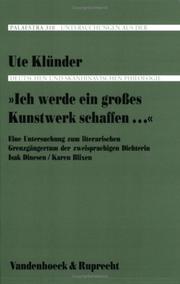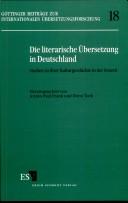| Listing 1 - 10 of 93 | << page >> |
Sort by
|
Book
Abstract | Keywords | Export | Availability | Bookmark
 Loading...
Loading...Choose an application
- Reference Manager
- EndNote
- RefWorks (Direct export to RefWorks)
Translations --- Translators --- Translating and interpreting --- History and criticism --- Translations - History and criticism
Book
ISBN: 9780231165945 9780231165952 0231165943 0231165951 Year: 2015 Publisher: New-York: Columbia Univ. Press,
Abstract | Keywords | Export | Availability | Bookmark
 Loading...
Loading...Choose an application
- Reference Manager
- EndNote
- RefWorks (Direct export to RefWorks)
Theory of literary translation --- Fiction --- Literature --- Translating and interpreting --- Translations --- History and criticism --- Littérature --- Traduction --- Translating and interpreting. --- History and criticism. --- Traduction. --- Literature - Translations - History and criticism --- Fiction - Translations - History and criticism
Book
ISBN: 9782253084532 2253084530 Year: 2010 Volume: 31646 Publisher: Paris: Librairie générale française,
Abstract | Keywords | Export | Availability | Bookmark
 Loading...
Loading...Choose an application
- Reference Manager
- EndNote
- RefWorks (Direct export to RefWorks)
Book

ISSN: 2270342X ISBN: 9782251700014 2251700013 Year: 2013 Volume: 1 Publisher: Paris: Les Belles Lettres,
Abstract | Keywords | Export | Availability | Bookmark
 Loading...
Loading...Choose an application
- Reference Manager
- EndNote
- RefWorks (Direct export to RefWorks)
Traduit en anglais, en allemand, en italien, et même en russe, bulgare, hongrois et serbe, Miseria y esplendor de la traducción, du philosophe espagnol José Ortega y Gasset (1883-1955), n'avait encore jamais été traduit ni publié en France. Il n'était jusqu'ici accessible dans notre langue que dans la version québécoise de Clara Foz (TTR : traduction, terminologie, rédaction, volume 17, numéro 1, 2004, page 13-53). Ce célèbre essai fut cependant rédigé en 1937 à Paris, où, craignant pour sa vie, Ortega s'était réfugié ; publié la même année dans le journal argentin La Nación, il sera repris en volume en 1940 dans un recueil intitulé El libro de las misiones. Sans être lui-même traducteur, Ortega connaissait fort bien plusieurs langues (outre le latin et le grec : le français, l'italien, l'anglais et surtout l'allemand), et il s'intéressait depuis longtemps aux phénomènes linguistiques. De plus, il avait joué un rôle moteur dans la traduction de certaines oeuvres étrangères en espagnol dans le but d'ouvrir l'Espagne à l'Europe, notamment par le biais de la Revista de occidente qu'il avait fondée. Dès l'ouverture, Miseria y esplendor de la traducción se présente comme la transcription parfaitement vraisemblable, et sans doute en partie vraie d'une séance savante au Collège de France, parfois houleuse. Si certains intervenants sont nommés, la plupart restent anonymes : selon l'un des plus prolixes, la traduction n'appartient pas au même genre littéraire que le texte traduit, et elle n'a pas à être belle, mais à être claire : "La traduction n'est pas l'oeuvre, mais un chemin vers l'oeuvre". Ortega n'est ici qu'une voix parmi d'autres, même si c'est lui qui introduit et conclut le dialogue. Du reste, à ce cadre "réaliste", se superpose celui d'un genre prestigieux, le dialogue renaissant d'inspiration platonicienne, auquel Ortega rend hommage par la forme même qu'emprunte son étude. Dans Misère et splendeur de la traduction, nouveau Socrate, il ouvre un débat sur la traduction plus qu'il ne développe complètement ses idées : le lecteur est incité à approfondir la réflexion par lui-même. Cette dimension dialogique n'est pas indifférente dans un essai qui fait le pari qu'il existe certes un abîme entre les langues et les nations, mais qu'on peut le transcender. Elle l'est encore moins dans le contexte de la guerre civile espagnole, jamais évoquée mais constamment présente à l'arrière-plan.
Vertaaltheorie --- Traduction. --- Traduction --- geschiedenis --- Histoire. --- #KVHA:Vertaalwetenschap --- geschiedenis. --- Translations --- Philosophy --- History and criticism --- Translations - History and criticism
Book
ISBN: 9781138641754 9781138641730 9781315630298 1138641758 1138641731 131563029X 1317246594 1317246608 Year: 2019 Publisher: London: Routledge,
Abstract | Keywords | Export | Availability | Bookmark
 Loading...
Loading...Choose an application
- Reference Manager
- EndNote
- RefWorks (Direct export to RefWorks)
Translation and World Literature offers a variety of international perspectives on the complex role of translation in the dissemination of literatures around the world. Eleven chapters written by multilingual scholars explore issues and themes as diverse as the geopolitics of translation, cosmopolitanism, changing media environments and transdisciplinarity. This book locates translation firmly within current debates about the transcultural movements of texts and challenges the hegemony of English in world literature. Translation and World Literature is an indispensable resource for students and scholars working in the fields of translation studies, comparative literature and world literature

ISBN: 352520583X 9783525205839 Year: 2000 Volume: 310 Publisher: Göttingen: Vandenhoeck und Ruprecht,
Abstract | Keywords | Export | Availability | Bookmark
 Loading...
Loading...Choose an application
- Reference Manager
- EndNote
- RefWorks (Direct export to RefWorks)
Book
ISBN: 9789052013961 9052013969 Year: 2008 Volume: 23 Publisher: Bruxelles Bern Berlin ... P.I.E. Peter Lang
Abstract | Keywords | Export | Availability | Bookmark
 Loading...
Loading...Choose an application
- Reference Manager
- EndNote
- RefWorks (Direct export to RefWorks)
This collection provides the first full-length investigation of the oeuvre of one of Britain's leading dramatists : Timberlake Wertenbaker. By considering the polyglot playwright's theatre from translations and adaptations to new plays as a dynamic continuum of "translations and transformations", Maya Roth and Sara Freeman create an intriguing, focused frame for understanding Wertenbaker's work as distinctly cross-cultural, theatrically rich, and intertextual, providing a prescient case study of the translational turn emerging in international theatre today.The contributors investigate translation theory and practice through Wertenbaker's diverse linguistic and genre translations – from French, ancient Greek, and Italian to English, and from myth, history, classics, fairytale, and literature to the stage. Interrelated chapters by scholars and artists from varied countries, language traditions, and disciplines use performance studies, comparative literature, feminist theory, and cultural anthropology to position Wertenbaker's theatre as a critical nexus for analyzing – and imagining – cross-historical dialogues with contemporary audiences and our plural legacies.Thanks to its substantive engagement with the ethics, theories, and collaborative practices of theatrical translation and adaptation more broadly, and its equally rigorous examination of Wertenbaker's hybridic politics and poetics, this collection can serve as a useful resource for scholars and artists, both.
Femmes auteurs dramatiques --- Toneelschrijfsters --- Women dramatists --- Wertenbaker, Timberlake --- Criticism and interpretation --- Translations --- History and criticism --- Wertenbaker, Timberlake - Criticism and interpretation --- Wertenbaker, Timberlake - Translations - History and criticism
Book
ISSN: 21173494 ISBN: 9782812449369 2812449365 Year: 2016 Volume: 17 Publisher: Paris: Classiques Garnier,
Abstract | Keywords | Export | Availability | Bookmark
 Loading...
Loading...Choose an application
- Reference Manager
- EndNote
- RefWorks (Direct export to RefWorks)

ISBN: 3503079068 9783503079063 Year: 2004 Volume: 18 Publisher: Berlin: Erich Schmidt,
Abstract | Keywords | Export | Availability | Bookmark
 Loading...
Loading...Choose an application
- Reference Manager
- EndNote
- RefWorks (Direct export to RefWorks)
Book
ISBN: 9781138698017 9781315520131 1315520133 1315520117 1315520125 9781315520124 9781315520117 9781315520100 1315520109 1138698016 0367729032 9780367729035 Year: 2019 Publisher: New York, NY Routledge
Abstract | Keywords | Export | Availability | Bookmark
 Loading...
Loading...Choose an application
- Reference Manager
- EndNote
- RefWorks (Direct export to RefWorks)
Written by leading experts in the area, The Routledge Handbook of Spanish Translation Studies brings together original contributions representing a culmination of the extensive research to date within the field of Spanish Translation Studies. The Handbook covers a variety of translation related issues, both theoretical and practical, providing an overview of the field and establishing directions for future research. It starts by looking at the history of translation in Spain, the Americas during the colonial period and Latin America, and then moves on to discuss well-established areas of research such as literary translation and audiovisual translation, at which Spanish researchers have excelled. It also provides state-of-the-art information on new topics such as the interface between translation and humour on the one hand, and the translation of comics on the other. This Handbook is an indispensable resource for postgraduate students and researchers of translation studies.
| Listing 1 - 10 of 93 | << page >> |
Sort by
|

 Search
Search Feedback
Feedback About UniCat
About UniCat  Help
Help News
News